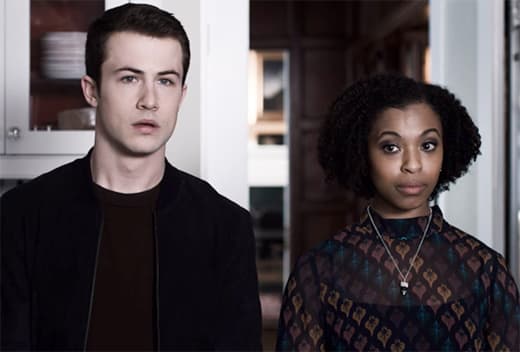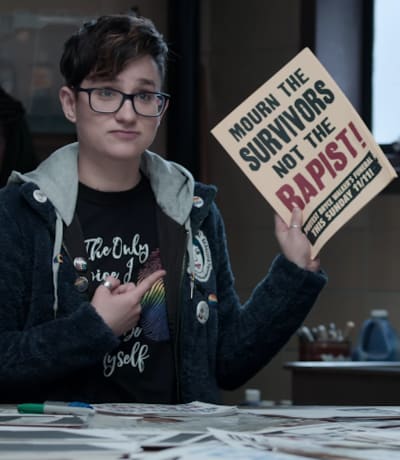13 Reasons Why has a troublesome representation of its LGBTQ+ characters, especially during 13 Reasons Why Season 3, particularly in the portrayal and downfall of Monty de la Cruz.
If we boil it down, Monty and Bryce Walker are one and the same.
Their characterization is built around the same angry toxic masculinity: jocks who are mad at the world and excuse their hateful and distasteful behavior on their challenging upbringing.
The entirety of the third season dedicates itself to Bryce’s redemption for all his past wrongdoings.
The show received a lot of backlash for the complete change in narrator and narrative, and rightfully so.
What once was a show focused on teen suicide and the amalgamation of the reasons behind Hannah Baker’s death turned into a sob story for the perpetrator of rape.
Perhaps a commentary on how the justice system favors the white upper class.
Bryce’s storyline contrasts with Monty’s, a kid from a working-class Latino family who gets imprisoned immediately after Tyler Down’s statement to the police about the sexual assault from the previous season.
Monty deserved his sentence, but not his untimely death, which was thrown in haphazardly last minute as the final episode was coming to an end.
Monty’s death gave way for Ani to pin Bryce’s murder on him, fully knowing he had a solid alibi.
During one of the final scenes, Winston approaches Ani confronting her about her lies to the police, reminding her Monty was actually with him the night of Bryce’s murder.
He was a human being, ok. He was a human being. He didn’t deserve to die like that.
Winston
Although Monty’s death is attributed to his sexual assault crimes against Tyler, his wrongful conviction of Bryce’s murder is ridiculous.
Related: LGBTQ+ Tropes on TV Need to Stop
The slow finger pointing at each character, suddenly to reveal the truth and a coverup in the final episode was all too fast and anticlimactic.
The unrealistic “resolution” of the investigation in the third season left numerous holes in the plotline, reminiscent of Pretty Little Liars. Yes, it’s fiction, but how can a show portray such an nonchalant false solution.
Monty’s informal “coming out” got rushed, and we didn’t have time to process it before he was instantly killed off. Dare we say the “bury your gays” trope is at play?
His death was an easy scapegoat that could’ve been dealt with differently. Had the show at least placed more importance on his death or hadn’t quickly brushed it under the rug, it would’ve done his character more justice.
After Lexa’s fateful demise in The 100 led to an upheaval in the LGBTQ+ community revealing a larger issue within media, we’re baffled any show had the audacity to do the community dirty yet again.
It’s become an unfortunate commonality that LGBTQ+ characters are seen as expendable to storylines. They aren’t given full depth to their character before they are killed off.
Despite Monty’s character not receiving enough emotional scenes to invoke sympathy, his final scene with his father spitting in his face was arguably more powerful than Bryce’s entire redemptive arc.
It would’ve strengthened the show had he been kept alive. But instead, the scattered breadcrumbs of the hidden truth were left for the next season to uncover.
Related: 13 Actors Who Saw the Other Side of Their Sexuality
Of course, the next season will be used to recover the lost truth all the characters attempted to bury, at least here’s hoping.
Albeit, the show isn’t going to end in a mass arrest of high schoolers, so the attempted cliffhanger was pretty underwhelming.
Monty’s characterization of being the angry closeted jock loses its credibility early on due to its lack of relevance. His sexuality reveal was purely used as shock value for viewers.
Had it been for more than that, he would’ve received a more thoughtful characterization. Instead, he received a throwaway storyline that was disposed of for the sake of furthering Alex Standall’s storyline.
Whereas Bryce and Hannah’s deaths received full seasons and reactions, nobody seemed to bat an eye with Monty’s death. We weren’t even given a small scene of the effect his death had on his family.
Alongside the poor representation of Monty, is Casey Ford, the character who aids Jessica in her fight against rapists.
She falls into the “man-hating lesbian” trope that again is unoriginal and overused. Her hopes to take down the patriarchy are attributed to a lesbian characteristic when in reality could be used for any woman.
These characters are placed in the background where they would fit easiest. Merely woven into the plotline to portray a stronger sense of diversity.
They could’ve received more dynamic personas. LGBTQ+ characters are more than just stereotypes and should be used to create a dynamic story.
It’s unfortunate such a major show chose to lend itself to tropes.
Related: Enjoy UNLIMITED access to thousands of Movies and TV shows with Amazon Prime Video
We’ll have to wait until next season to see if 13 Reasons Why can redeem itself the way it redeemed Bryce Walker.
Do you agree?
Take it to the comments, and don’t forget to let us know what you thought of the finale of the third season.
Inga Parkel is a staff writer for TV Fanatic. Follow her on Twitter.







